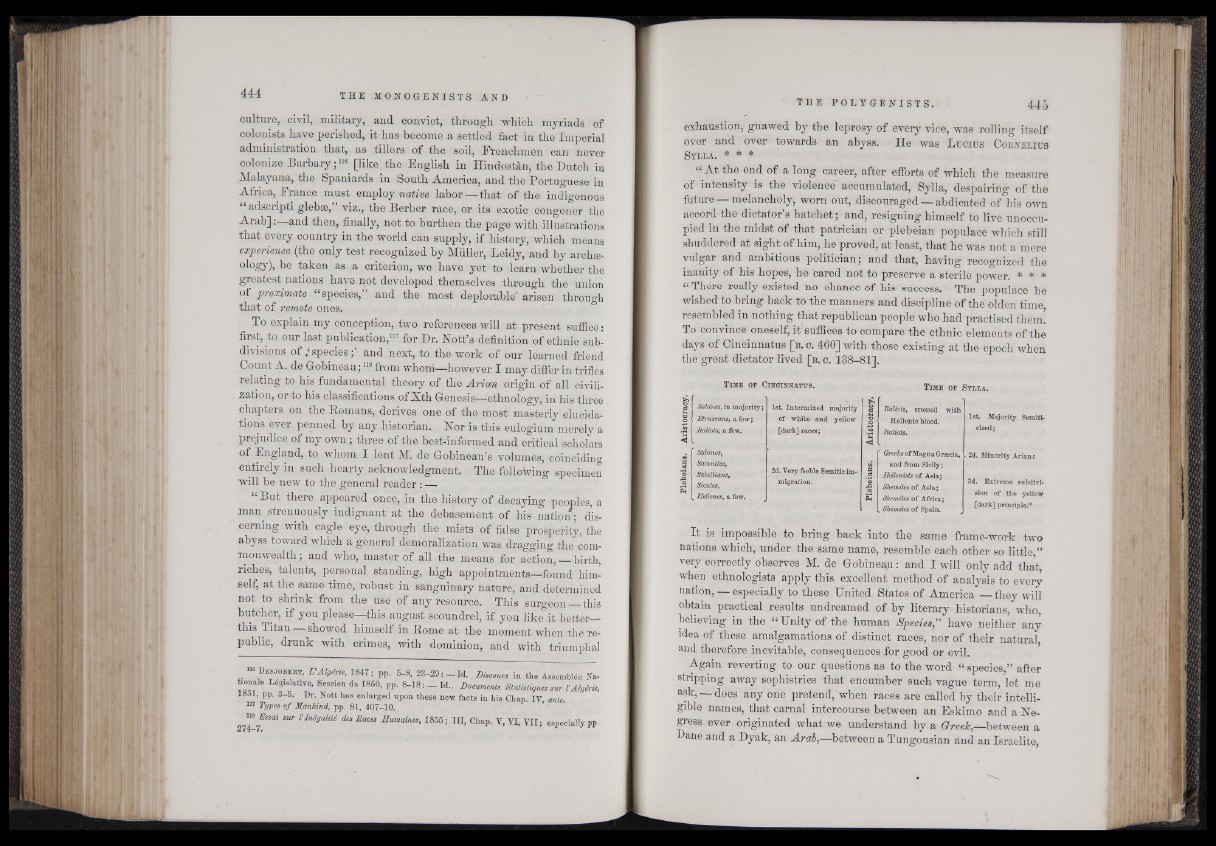
culture, civil, military, and convict, through which myriads of
colonists have perished, it has become a settled fact in the Imperial
administration that, as tillers of the soil, Fren chinen can never
colonize Barbary;116 [like the English in Hindostán, the Dutch in
Malayana, the Spaniards in South America, and the Portuguese in
Africa, France must employ native labor —that of the indigenous
“ adscripti glehse,” viz., the Berber race, or its exotic congener the
Arab]: and then, finally, not to burthen the page with illustrations
that every country in the world can supply, if history, which means
experience (the only test recognized by Müller, Leidy, and by archse-
®l°gy)> he taken as a criterion, we have yet to learn whether the
greatest nations have not developed themselves through the union
of proximate “ species,” and the most deplorable arisen through
that of remote ones.
To explain my conception, two references will at present suffice:
first, to our last publication,117 for Dr. Nott’s definition of ethnic subdivisions
o f ¡ sp e c ie sa n d next, to the work of our learned friend
Count A. de Gobineau;118 from whom—however I may differ in trifles
relating to his fundamental theory of the Arian origin of all civilization,
or*to his classifications of Nth Genesis—ethnology, in his three
chapters on the Romans, derives one of the most masterly elucidations
ever penned by any historian. Nor is this eulogium merely a
prejudice of my own; three of the best-informed and critical scholars
of England, to whom I lent M. de Gobineau’s volumes, coinciding
entirely in such hearty acknowledgment. The following specimen
will he new to the general reader : —
But there appeared once, in the history of decaying peoples, a
man strenuously indignant at the debasement of his nation; discerning
with eagle eye, through the mists of false prosperity, the
abyss toward which a general demoralization was dragging the commonwealth;
and who, master of all the means for action, birth,
riches, talents, personal standing, high appointments—found himself,
at the same time, robust in sanguinary nature, and determined
not to shrink from the use of any resource. This surgeon this
butcher, if you please—this august scoundrel, if you like it better—
this Titan — showed himself in Rome at the moment when the republic,
drunk with crimes, with dominion, and with triumphal
D e s j o b e r t , L'Algérie, 1847; pp. 5-8, 23-29:- I d . Discour, in the A s s em b l é e . N a tionale
Législative, Session de 1850, pp. 8-18 : - Id., Document, Statistiques cur VAlgérie,
’ PP- 3_5- Dr- Nott has enlarged upon these new facts in his Chap. IV ante.
117 Types of Mankind, pp. 81, 407-10.
274^7^™* SW VInê3aliié dea Races Surnames, 1855; III, Chap. V, VI, VII; especially pp
exnausnon, gnawed Dy
•LCjJA K.
c v ci y uwo iuj.li
over and over towards
an abyss.
He was Lucius C or n e liu s
S ylla. * * *
“At the end of a long career, after efforts of which the measure
of intensity is the violence” accumulated, Sylla, despairing of the
future — melancholy, worn out, discouraged — abdicated of his own
accord the dictator’s hatchet; and, resigning himself to live unoccupied
in the midst of that patrician or plebeian populace which still
shuddered-at sight of him, he proved, at least, that he was not a mere
vulgar and ambitious politician; and that, having recognized the
inanity of his hopes, he cared not to preserve a sterile power. * * *
“ There really existed no chance of his success. The populace he
wished to bring back to the manners and discipline of the olden time
resembled in nothing that republican people who had practised them!
To convince oneself, it suffices to compare the ethnic elements of the
days of Cincinriatus [ b . c. 460] with those existing at the epoch when
the great dictator lived [ b . c. 138-81].
T im e o f C ik c in n a t u s . T im e o f S y l l a .
j Sabines, in majority ;
! Etruscans, a few
Italiots, a few.
BD I '<Ö II
Sabines,
Samnites,
Sabellians,
Sicules,
Hellenes, a few.
'
1st. Intermixed majority © oi Italiots, crossed with
of white and yellow oo Hellenic blood.
[dark] races; !§ Italiots.
<
Greeks of Magna Grascia,
m and from Sicily;
2d. Very feeble Semitic im
a cj Hellenists of Asia;
migration. ’© ■ ¿a ©
Shemites of Asia;
Ph Shemites of Africa;
Shemites of Spain.
1st. Majority Semiti-
cized;
2d. Minority Arian:
3d. Extreme subdivision
of the yellow
[dark] principle.”
It . is impossible to bring hack into the same frame-work two
nations which, under the same name, resemble each other so little ”
very correctly observes M. de Gobineau: and I will only add that,
when ethnologists apply this excellent method of analysis to eveiy
nation, — especially to these United States of America —they will
obtain practical results undreamed of by literary historians, who,
believing in the “ Unity of the human Species," have neither any
idea of these amalgamations of distinct races, nor of their natural
and therefore inevitable, consequences for good or evil.
Again reverting to our questions as to the word “ species,” after
stripping away sophistries that encumber such vague term, let me
ask, —does any one pretend, when races are called by their intelligible
names, that carnal intercourse between an Eskimo and a Negress
ever originated what we understand by a Greek—between a
Bane and a Dyak, an Ami,—between a Tungousian and an Israelite,